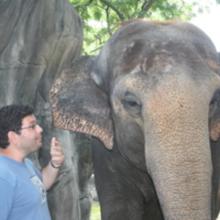By Shai ben Ami and Kathryn Medill
This year, the Modern Hebrew and Israel Studies program in MELC has welcomed an ISEF and Israel Institute Fellow, Shai ben Ami. We are happy to have Shai here to teach courses for students interested in both Middle Eastern Studies and Environmental Studies! In this interview, Shai told us about his background, his research, and the courses he will be teaching for the UW this year.
Tell us about yourself.
I was born and raised in Jerusalem, where I have spent most of my life. My parents were born in Jerusalem to Moroccan Jewish immigrants. At 13, I began volunteering at the Biblical Zoo (Tisch Family Zoological Gardens), which became a cornerstone of my life. While I initially aspired to become a zoologist, I later shifted my focus to History and Sociology due to my challenges with mathematics. I earned my BA from the Hebrew University of Jerusalem, where I also directed the youth department in the university’s Social Involvement unit. This role involved managing six programs aimed at helping youth from non-academic backgrounds transition comfortably into academic settings.
Despite my academic pivot, I continued working as a keeper and guide at the zoo on weekends, drawn by my passions for wildlife conservation and educating visitors. In 2012, I moved to Regensburg, Germany, to pursue an MA in American-European Studies. My thesis compared the historical narratives presented to visitors at the Vienna Zoo (Europe’s oldest) and the Philadelphia Zoo (the first in the U.S.).
In 2014, I returned to Israel to lead educational initiatives at the Israel Aquarium. This role involved crafting educational messages and building a dedicated team. The aquarium opened in 2017, and I continued there until 2020 when I decided to complete my PhD. My doctoral research examined the history of zoos in Israel, exploring their roles in nation-building and urban development. I completed my PhD in 2022, and my findings were recently published as a book in Hebrew.
Can you explain a little of your work on zoos and how they are different across the world?
In modern times, urban zoos have developed and served as a contact zone between local people from all backgrounds and animals (and cultures) around the world. As such, they give us a unique cultural perspective on both state and city and their fingerprints on their cultural institutions.
My PhD research goal was to understand the international, national, and urban role of zoos. Specifically, it focused on the foundation of zoos in Mandatory Palestine during the British Mandate and in the newly formed independent Israeli state. The study investigated the processes that led to the establishment of city zoos and alternative animal collections in Israel. Furthermore, this study offered a unique global comparison based on the role of key figures; capital, international, national, and municipal politics; colonial power; immigration and immigrants; regulations and human networks. I analyzed historical documents through archives and manuscripts. My findings indicate that zoos worldwide played an important role in developing urban and national spaces and served to fulfill national and urban aspirations. The Israeli case also shows a deep connection to the broader Zionist nation-building process. My research offers a reflection of identities based on memories from Europe and the birth of new cities and a new state.
What courses are you teaching for MELC this year?
My first course was “Israeli Identities,” which I enjoyed teaching during the fall quarter. In winter, I am teaching “Wildlife Conservation in Israel and the Middle East,” focusing on the Middle East's habitats and fauna.
In the Spring I will teach two courses:
"A Tale of Two Cities: Jerusalem and Tel Aviv" (JEW ST 233 A) will explore the cultural, Historical, and Sociological aspects of Israel's two largest cities.
"Zoos in International Relations" will be offered through the Jackson School of International Studies (JSIS). This course will focus on how zoos developed historically, their modern roles, and their impact on international relations.
What are some things that your students will experience or learn as part of your classes?
I strongly believe that my role as a professor is to expose my students to various ideas and points of view, make them think about things, and discover new things together. I want to hear the students, listen (and read) their reflections on the readings and the information, and to understand the complexities. I try, when possible, to use methods such as one-pagers and assignments that will allow the students to reflect and share their experiences and ideas. I also try to use videos, movies, and other cultural and artistic forms to demonstrate the concepts we discuss in class.
What will your students gain from learning about how these topics are handled in Middle Eastern contexts?
In a global world, it's crucial to understand how things work in different places. For example, if you study conservation, I believe that learning how conservation is being done in other parts of the world can make you a better student and better at what you will do in the future.
Understanding the complexities of a region, a state, or a city can broaden one's perspective and change one's perspective. I try to ensure that people think and feel, that they try to understand others and how they think/feel or their belief systems, especially when talking about complicated matters.
